//Case Study
DECENT WORK UNLOCKS ACCESS TO FINANCE
Access to finance is key for SME growth. Investors are important in mitigating the social risks by protecting and promote sound labour relations, it gives value chain stability as companies benefit from increased operational efficiency, reduced reputational risks and a healthier and more productive workforce.
In a partnership between Swedfund and the Victoria Commercial Bank the SWP method changed the way the bank use workplace cooperation to strengthen customer relations and the sustainablity as .



